Pensions poverty is a real issue for many individuals and households in Britain today, but there is growing concern over the retirement outcomes of people who are LGBTQI+.
Sometimes referred to as the 'rainbow retirees', members of this community have had to contend with years of financial unfairness.
Seminal court cases, such as Walker v Innospec in 2015 and Goodwin in 2022, have been hard fought to ensure that survivors' benefits can be passed to same-sex spouses and civil partners.
But even though policy and the courts have found in favour of pensions fairness for all, members of the LGBTQI+ community still face issues.

On average, LGBTQI+ employees in the UK earn almost £7,000 less than their heterosexual and cisgender counterparts.
Andrew Megson, My Pension ExpertAccording to Andrew Megson, executive chair at My Pension Expert, the LGBTQI+ community "faces significant challenges when it comes to preparing for retirement – and this could contribute to a less secure financial future".
So what are the potential issues and how can advisers understand these and help affected clients towards a more secure financial future?
Factors affecting retirement outcomes
As highlighted by Megson and Jamie Lowe, founder of Manchester-based True Self Wealth, there are many reasons behind the assertion that members of the LGBTQI+ community face poorer pension outcomes.
Reasons range from direct expenses, such as paying for healthcare not covered by insurance, but also indirect expenses that "cannot be quantified so easily", according to Lowe.
He says these could be anything from having suffered pay discrimination in the workplace through to a lack of familial inheritances after being cut off as a result of coming out.
Lowe says: "There is a wealth gap created by discrimination in the workplace, with fewer opportunities for promotion. Seeking new employment is scary when you don’t know if it’ll be a safe place.
"LGBTQ+ people often have guilt and shame built into them from an early age. As much as we move forward and past that, it often still lingers in the background.
"When someone has a feeling that they aren’t worthy, they are unlikely to speak up and ask for a pay rise or to put themselves forward for opportunities including promotions."
This is not just anecdotal.

There is a wealth gap created by discrimination in the workplace.
Jamie Lowe, True Self WealthAccording to Megson: "One key reason for this lies in the pay gap. Recent research found that on average, LGBTQI+ employees in the UK earn almost £7,000 less than their heterosexual and cisgender counterparts – that equates to a 16 per cent pay gap.
"Naturally, this will mean that LGBTQI+ employees will have less money in their pocket, which can be particularly challenging during the cost of living crisis.











